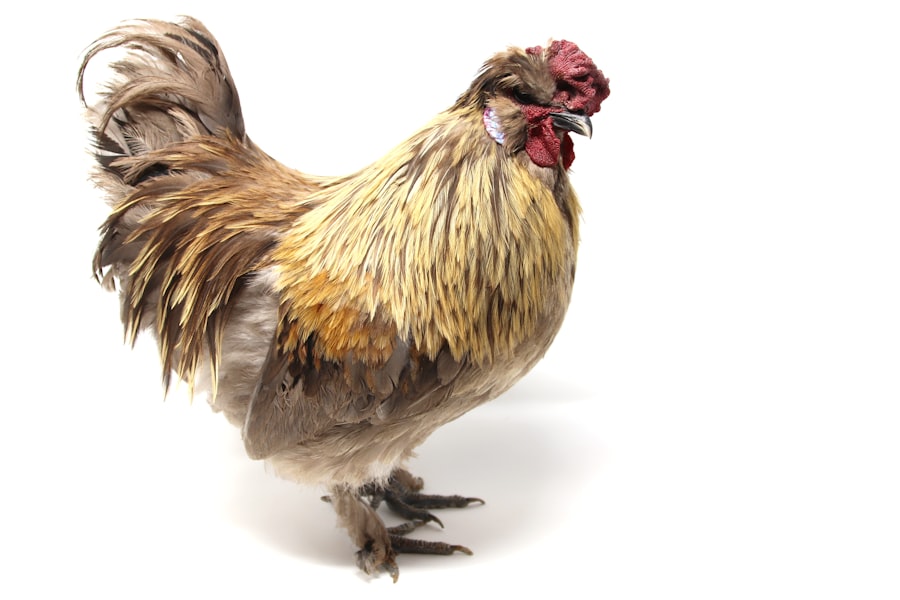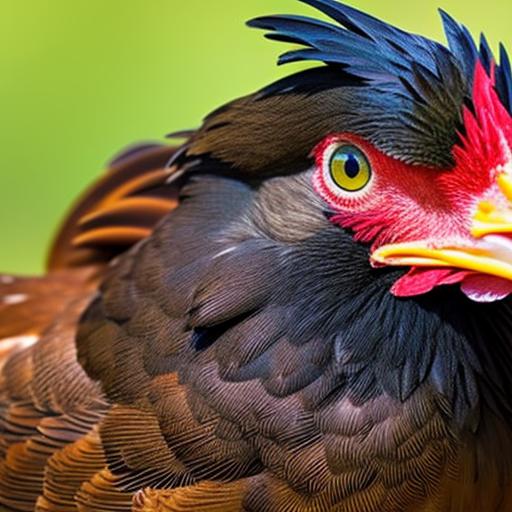Backyard chickens have a long and storied history, dating back thousands of years. They were first domesticated in Southeast Asia around 6000 BC and have since spread to every corner of the globe. In recent years, keeping backyard chickens has become increasingly popular, with more and more people realizing the benefits of having these feathered friends in their own backyard.
There are several reasons why keeping backyard chickens is gaining popularity. First and foremost, it allows people to have a constant supply of fresh eggs. There is nothing quite like going out to your backyard in the morning and collecting eggs that were laid just hours before. In addition to the eggs, chickens also provide a valuable source of fertilizer for your garden. Their droppings are rich in nutrients and can be used to improve the soil quality and promote healthy plant growth.
Another benefit of keeping backyard chickens is pest control. Chickens are natural foragers and will happily eat insects, slugs, and other pests that can damage your garden. They can help keep your yard free from unwanted critters without the need for harmful chemicals or pesticides.
Furthermore, keeping backyard chickens can be educational for children. It teaches them about responsibility, where their food comes from, and the importance of caring for animals. It also provides an opportunity for hands-on learning about biology, life cycles, and sustainability.
Lastly, there are therapeutic benefits to keeping backyard chickens. Many people find that spending time with their chickens helps reduce stress and anxiety. The simple act of watching them scratch around in the yard or listening to their gentle clucking can be incredibly calming and soothing.
Key Takeaways
- Keeping backyard chickens has many benefits, including fresh eggs, natural pest control, and fertilizer for your garden.
- When choosing a breed of chicken, consider factors such as egg production, temperament, and climate adaptability.
- A well-designed chicken coop should provide adequate space, ventilation, and protection from predators.
- Proper nutrition for your hens includes a balanced diet of feed, water, and occasional treats.
- Maintaining a clean and healthy environment involves regular cleaning of the coop and providing fresh bedding and water.
Benefits of keeping backyard chickens
One of the main benefits of keeping backyard chickens is having a constant supply of fresh eggs. There is something incredibly satisfying about collecting eggs from your own flock and knowing exactly where they came from. Fresh eggs taste better, have a richer yolk color, and are higher in nutrients compared to store-bought eggs. They are also free from any antibiotics or hormones that may be present in commercial eggs.
In addition to the eggs, chickens provide a valuable source of fertilizer for your garden. Their droppings are rich in nitrogen, phosphorus, and potassium, which are essential nutrients for plant growth. By composting the chicken manure and adding it to your garden, you can improve soil fertility and promote healthy plant growth. This natural fertilizer is much safer and more environmentally friendly than synthetic fertilizers.
Chickens are also excellent pest controllers. They love to scratch and peck at the ground, searching for insects, slugs, and other pests. By allowing your chickens to free-range in your yard or garden, they can help keep the pest population under control. This means fewer pests damaging your plants and less need for harmful pesticides or chemicals.
Keeping backyard chickens can also be educational for children. It teaches them about responsibility, where their food comes from, and the importance of caring for animals. Children can learn about the life cycle of chickens, from hatching eggs to raising chicks to watching them grow into adult hens. They can also learn about sustainable practices such as composting and organic gardening.
Furthermore, spending time with chickens has therapeutic benefits. Many people find that being around animals helps reduce stress and anxiety. Chickens are gentle creatures that can provide comfort and companionship. The simple act of watching them scratch around in the yard or listening to their gentle clucking can be incredibly calming and soothing.
Choosing the right breed of chicken
When it comes to choosing the right breed of chicken for your backyard flock, there are several factors to consider. First and foremost, you need to think about your climate and location. Some breeds are better suited for cold climates, while others thrive in hot climates. You also need to consider the size of your backyard and the amount of space you have available for your chickens. Some breeds are more suited for small spaces, while others require more room to roam.
Popular breeds for backyard chickens include the Rhode Island Red, the Plymouth Rock, and the Sussex. These breeds are known for their hardiness, good egg production, and friendly temperament. They are also relatively easy to care for and adapt well to different climates.
When it comes to purchasing chickens, there are several options available. You can buy them from a local farm or hatchery, or you can order them online. It’s important to choose a reputable source that breeds healthy and well-cared-for chickens. You should also consider whether you want to start with chicks or adult hens. Chicks require more care and attention in the beginning, but they can be a rewarding experience as you watch them grow and develop.
Setting up a chicken coop
Once you have chosen the right breed of chicken, it’s time to set up a chicken coop. The coop is where your chickens will spend most of their time, so it’s important to provide them with a safe and comfortable living space.
When choosing a location for your coop, consider factors such as sunlight, shade, and protection from the elements. The coop should be placed in an area that receives plenty of natural light but is also sheltered from strong winds and extreme temperatures. It should also be easily accessible for cleaning and maintenance.
The size of your coop will depend on the number of chickens you plan to keep. As a general rule of thumb, each chicken should have at least 4 square feet of indoor space and 10 square feet of outdoor space. This will ensure that they have enough room to move around and engage in natural behaviors such as scratching and dust bathing.
When it comes to materials, there are several options available. Wood is a popular choice for its durability and natural insulation properties. It’s important to choose untreated wood to avoid any harmful chemicals leaching into the coop. Other materials such as metal or plastic can also be used, but they may require additional insulation to keep the chickens warm in colder climates.
The design and features of your coop will depend on your personal preferences and the needs of your chickens. Some important features to consider include nesting boxes for egg-laying, roosting bars for sleeping, and ventilation for fresh air circulation. It’s also important to provide a secure door and fencing to protect your chickens from predators.
Keeping the coop clean is essential for the health and well-being of your chickens. Regularly remove droppings and soiled bedding, and replace it with fresh bedding. This will help prevent the buildup of ammonia and bacteria, which can lead to respiratory issues and other health problems. It’s also a good idea to periodically deep clean the coop using a mild detergent and water.
Providing proper nutrition for your hens
Proper nutrition is essential for the health and productivity of your hens. Chickens require a balanced diet that includes a combination of grains, protein, vitamins, and minerals.
There are several types of feed available for chickens, including pellets, crumbles, and mash. Pellets are compressed feed that provides a complete and balanced diet. Crumbles are smaller pieces of feed that are easier for young chicks to eat. Mash is a loose form of feed that can be mixed with water to create a porridge-like consistency.
In addition to their regular feed, chickens also require access to fresh water at all times. Water is essential for digestion, egg production, and overall health. Make sure to provide clean water in a container that is large enough for all your chickens to drink from comfortably.
Chickens also benefit from supplements such as grit and oyster shell. Grit is small stones or pebbles that chickens use to grind their food in their gizzard. It helps with digestion and nutrient absorption. Oyster shell is a source of calcium, which is important for strong eggshells. It can be offered free-choice in a separate container.
Treats and snacks can also be given to chickens in moderation. Some popular treats include fruits, vegetables, mealworms, and kitchen scraps. However, it’s important to avoid giving them anything that is toxic or harmful to their health. Consult a list of safe and unsafe foods for chickens to ensure you are providing them with appropriate treats.
Maintaining a clean and healthy environment

Maintaining a clean and healthy environment is crucial for the well-being of your chickens. A clean coop helps prevent the spread of diseases and parasites, and it provides a comfortable living space for your hens.
Cleanliness starts with regular coop maintenance. Remove droppings and soiled bedding on a daily basis, and replace it with fresh bedding. This will help prevent the buildup of ammonia and bacteria, which can lead to respiratory issues and other health problems. It’s also important to periodically deep clean the coop using a mild detergent and water.
In addition to keeping the coop clean, it’s important to maintain a clean run or outdoor area for your chickens. Remove any debris or waste on a regular basis, and provide fresh bedding or grass for them to scratch and peck at. This will help prevent the buildup of parasites such as mites or lice.
Preventing and treating common health issues is also an important part of maintaining a healthy environment for your chickens. Some common health issues include respiratory infections, mites or lice infestations, and egg-laying problems. Regularly inspect your chickens for any signs of illness or distress, and consult a veterinarian if necessary.
Protecting your chickens from predators
Protecting your chickens from predators is essential to their safety and well-being. There are several common predators that pose a threat to backyard chickens, including raccoons, foxes, coyotes, and birds of prey.
One of the best ways to deter predators is to secure the coop and run. Make sure the coop has a secure door that can be locked at night, and reinforce any weak spots or gaps in the fencing. Use hardware cloth or welded wire mesh with small openings to prevent predators from squeezing through or digging under the fence.
It’s also important to provide a safe and secure area for your chickens to free-range. This can be achieved by using portable electric fencing or by supervising them while they are out in the yard. Avoid leaving them unattended for long periods of time, especially during dusk and dawn when predators are most active.
Keeping your chickens happy and entertained
Keeping your chickens happy and entertained is important for their overall well-being. Chickens are social animals that thrive on interaction and stimulation.
One way to keep your chickens entertained is by providing enrichment activities. This can include hanging treats or toys for them to peck at, providing perches or roosting bars at different heights, or creating a dust bathing area for them to indulge in their natural behavior.
Providing a comfortable living space is also important for the happiness of your chickens. Make sure they have enough space to move around and engage in natural behaviors such as scratching and dust bathing. Provide plenty of fresh bedding or grass for them to peck at, and ensure they have access to clean water at all times.
Socializing with your chickens is another way to keep them happy and content. Spend time with them each day, talking to them and gently handling them. This will help build trust and create a bond between you and your chickens.
Collecting and using eggs
Chickens typically start laying eggs around 5-6 months of age, depending on the breed. The frequency of egg-laying will vary depending on factors such as breed, age, and environmental conditions. Most chickens will lay an egg every 1-2 days, with some breeds being more prolific layers than others.
When it comes to collecting eggs, it’s important to do so regularly to prevent them from becoming dirty or damaged. Eggs should be collected at least once a day, preferably in the morning when they are still fresh and clean. Handle the eggs gently to avoid cracking or breaking them.
Proper egg storage is also important to maintain their freshness and quality. Eggs should be stored in a cool and dry place, ideally in a refrigerator. They should be kept in a clean and odor-free container, with the pointed end facing downwards. It’s also a good idea to label the eggs with the date they were laid to keep track of their freshness.
Fresh eggs can be used in a variety of recipes, from breakfast dishes such as omelets and quiches to baked goods such as cakes and cookies. They can also be boiled, poached, or scrambled for a quick and nutritious meal. The possibilities are endless when it comes to using fresh eggs in your cooking.
Troubleshooting common issues with backyard chickens
While keeping backyard chickens can be a rewarding experience, it’s not without its challenges. There are several common issues that chicken owners may encounter, including egg-laying problems, behavioral issues, and health concerns.
Egg-laying problems can include issues such as soft-shelled eggs, shell-less eggs, or egg-binding. These issues can be caused by factors such as poor nutrition, stress, or underlying health problems. It’s important to ensure that your chickens have a balanced diet, access to fresh water, and a comfortable living environment. If egg-laying problems persist, it’s best to consult a veterinarian for further assistance.
Behavioral issues can include problems such as aggression, feather pecking, or excessive noise. These issues can be caused by factors such as overcrowding, boredom, or social hierarchy disputes. It’s important to provide enough space and enrichment activities for your chickens to prevent these issues from arising. If behavioral issues persist, it may be necessary to separate or rehome certain chickens.
Health concerns can include issues such as respiratory infections, mites or lice infestations, or egg-laying problems. It’s important to regularly inspect your chickens for any signs of illness or distress, and consult a veterinarian if necessary. It’s also important to practice good biosecurity measures to prevent the spread of diseases, such as quarantining new chickens and disinfecting equipment and tools.
Keeping backyard chickens has become increasingly popular in recent years, and for good reason. The benefits of having these feathered friends in your own backyard are numerous. From fresh eggs and natural fertilizer to pest control and educational opportunities, there are many reasons why people are choosing to keep backyard chickens.
Choosing the right breed of chicken is an important decision that should be based on factors such as climate, space availability, and personal preferences. Setting up a chicken coop requires careful consideration of location, size, materials, and design. Providing proper nutrition and maintaining a clean and healthy environment are essential for the well-being of your hens. Protecting your chickens from predators and keeping them happy and entertained are also important aspects of backyard chicken keeping.
Collecting and using fresh eggs is a rewarding experience that can be enjoyed in a variety of recipes. However, it’s important to troubleshoot common issues that may arise when collecting and using fresh eggs. One common issue is the presence of dirt or feces on the eggshell. This can be easily resolved by gently wiping the egg with a damp cloth or using a soft brush to remove any debris. Another issue is the possibility of cracked or broken eggs. If an egg is cracked, it should not be used as it may be contaminated. It’s also important to check for any signs of spoilage, such as a foul odor or unusual color, before using the egg in a recipe. Additionally, it’s crucial to properly store fresh eggs in the refrigerator to maintain their freshness and prevent bacterial growth. By addressing these common issues, one can ensure that the fresh eggs they collect and use are safe and delicious in their recipes.
If you’re interested in backyard chickens and want to ensure your hens are happy and healthy, you might find Dave Ingham’s article from 2017, “How to Keep Happy Hens,” a valuable resource. In this article, Ingham shares his expertise on creating a nurturing environment for your chickens. From providing proper shelter to offering a balanced diet, he covers all the essential aspects of chicken care. To further expand your knowledge on poultry keeping, you can also check out related articles such as “When Do Guinea Fowl Lay Eggs?” which provides insights into breeding guinea fowl, and “A-Frame Chicken Coop” and “Garden Chicken Coop,” both offering practical tips on constructing suitable housing for your feathered friends.
FAQs
What are backyard chickens?
Backyard chickens are domesticated chickens that are kept in a residential setting, typically in a backyard or garden.
What are the benefits of keeping backyard chickens?
Keeping backyard chickens can provide a source of fresh eggs, natural pest control, and fertilizer for gardens. They can also be enjoyable pets and can teach children about responsibility and animal care.
What do backyard chickens need to be happy and healthy?
Backyard chickens need access to fresh water, a balanced diet, shelter from the elements, and a safe and secure coop or enclosure. They also require regular veterinary care and protection from predators.
What should be included in a chicken coop?
A chicken coop should include nesting boxes for laying eggs, roosting bars for sleeping, and adequate ventilation. It should also be secure from predators and have easy access for cleaning.
What should be included in a chicken’s diet?
A chicken’s diet should consist of a balanced feed that includes protein, carbohydrates, vitamins, and minerals. They also require access to fresh water and may benefit from occasional treats such as fruits and vegetables.
What are some common health issues for backyard chickens?
Common health issues for backyard chickens include respiratory infections, parasites, and egg-laying problems. Regular veterinary care and proper hygiene can help prevent these issues.
Are there any laws or regulations regarding backyard chickens?
Laws and regulations regarding backyard chickens vary by location. It is important to check with local authorities to ensure that keeping chickens is legal and to comply with any regulations regarding coop size, number of chickens, and waste disposal.
Meet Walter, the feathered-friend fanatic of Florida! Nestled in the sunshine state, Walter struts through life with his feathered companions, clucking his way to happiness. With a coop that’s fancier than a five-star hotel, he’s the Don Juan of the chicken world. When he’s not teaching his hens to do the cha-cha, you’ll find him in a heated debate with his prized rooster, Sir Clucks-a-Lot. Walter’s poultry passion is no yolk; he’s the sunny-side-up guy you never knew you needed in your flock of friends!







